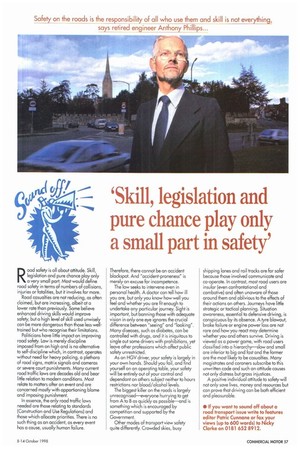'Skill, legislation and pure chance play only a small part in safety'
Page 65

If you've noticed an error in this article please click here to report it so we can fix it.
Road safety is all about attitude. Skill, legislation and pure chance play only a very small part. Most would define road safety in terms of numbers of collisions, injuries or fatalities, but it involves far more.
Road casualties are not reducing, as often claimed, but are increasing, albeit at a lower rate than previously. Some believe enhanced driving skills would improve safety, but a high level of skill used unwisely can be more dangerous than those less welltrained but who recognise their limitations. Politicians have little impact on improving road safety. Law is merely discipline imposed From on high and is no alternative to self-discipline which, in contrast, operates without need for heavy policing, a plethora of road signs, matrix signals and cameras or severe court punishments. Many current road traffic laws are decades old and bear little relation to modern conditions. Most relate to matters after an event and are concerned mostly with apportioning blame and imposing ounishment. In essence, he only road traffic laws needed are those relating to standards (Construction and Use Regulations) and those which allocate priorities. There is no such thing as an accident, as every event has a cause, usually human failure. Therefore, there cannot be an accident blackspot, And "accident-proneness" is merely on excuse For incompetence. The law seeks to intervene even in personal health. A doctor can tell how ill you are, but only you know how well you Feel and whether you are fit enough to undertake any particular journey. Sight is important, but banning those with adequate vision in only one eye ignores the crucial difference between "seeing" and "looking". Many diseases, such as diabetes, can be controlled with drugs, and it is iniquitous to single out some drivers with prohibitions, yet leave other professions which affect public safety unrestricted.
As an HGV driver, your safety is largely in your own hands. Should you fail, and Find yourself on an operating table, your safety will be entirely out of your control and dependant on others subject neither to hours restrictions nor blood/alcohol levels.
The biggest killer on the roads is largely unrecognised—everyone hurrying to get from A to B as quickly as possible—and is something which is encouraged by competition and supported by the Government.
Other modes of transport view safety quite differently. Crowded skies, busy shipping lanes and rail tracks are far safer because those involved communicate and co-operate. In contrast, most road users are insular (even confrontational and combative) and often unaware of those around them and oblivious to the effects of their actions on others. Journeys have little strategic or tactical planning. Situation awareness, essential to defensive driving, is conspicuous by its absence. A lyre blowout, brake failure or engine power loss are not rare and how you react may determine whether you and others survive. Driving is viewed as a power game, with road users classified into a hierarchy—slow and small are inferior to big and fast and the former are the most likely to be casualties. Many magistrates and coroners subscribe to this unwritten code and such an altitude causes not only distress but gross injustices. A positive individual attitude to safety will not only save lives, money and resources but can prove that driving can be both efficient and pleasurable.
• If you want to sound off about a road transport issue write to features editor Patric Cunnane or fax your views (up to 600 words) to Nicky Clarke on 0181 652 8912.


























































































































